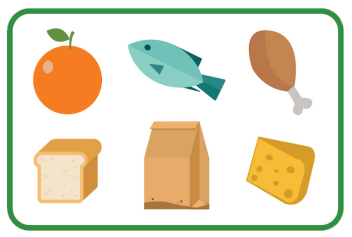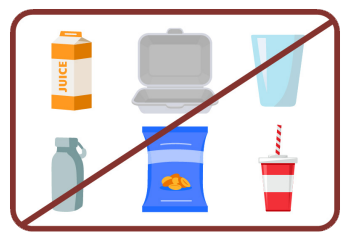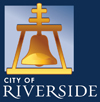A State of California mandate (Senate Bill 1383) requires all local jurisdictions to reduce organic waste disposal, such as food scraps, by 75% by 2025. To achieve this mandate, the City and your hauler, Athens Services, have launched a food scraps recycling program for all residential customers.
Beginning July 1, 2022, your existing green waste barrel will also be used to collect bagged food scraps. In order to prevent green waste contamination and avoid additional processing costs, please collect food scraps and bag them before placing them in the green waste barrel.
How to Recycle Food Waste Flyer (PDF)
3 Steps to Properly Recycle
1. Gather Materials
- Durable plastic bag (clear plastic bag recommended)
- Green waste bin
2. Collect Food Waste
- Put spoiled food and food scraps into a plastic bag
3. Place in Bin
- Securely tie the plastic bag and discard it in the green waste bin
- Food Scraps
- Fruits
- Spoiled food
- Food-Soiled Paper Products
- Vegetables
- Meats
- Seafood
- Bread
- Dairy

- Beverage Containers
- Cans
- Cups
- Bottles
- Food Containers
- Packaging
- To-Go Boxes

Frequently Asked Questions
A State of California mandate (Senate Bill 1383) requires all local jurisdictions to reduce organic waste disposal, such as food scraps, by 75% by 2025. To achieve this mandate, the City and your hauler, Athens Services, have launched a food scraps recycling program for all residential customers. The Pilot Program that launched earlier this year successfully collected over 1 ton of bagged food.
Beginning July 1, 2022, your existing green waste barrel will also be used to collect bagged food scraps. In order to prevent green waste contamination and avoid additional processing costs, please collect food scraps and bag them before placing them in the green waste barrel.
Durable 1-2 gallon bags. Clear plastic bags are recommended but not required and are available at local retailers and online sales outlets. We also encourage residents to reuse produce bags from the grocery store.
Unfortunately, no. The bags must be provided by the customer.
All fish and meat, vegetables, fruits, bread, dairy, and spoiled food. A full list of acceptable items can be found on our website.
Food scraps that have been bagged and placed inside of your green
waste barrel will be collected by your hauler on your regular service day each week.
Yes. All Riverside residents will be on this program
Organic waste in landfills emits 20% of the state’s methane. Your participation in this effort will assist in reaching the State of California’s goal of reducing organic waste by 75% by 2025 and create a healthier environment.
We encourage you to continue composting but all noncomposted food scraps items can be recycled through this program.
It is suggested that sprinkling baking soda in the food scraps
collection bag will reduce odors. You can also place your food scraps in the freezer until you have a full bag.
Yes. Currently, we are
not able to accept organic waste (green and food scraps) commingled in the same bin. However, after the
contents of your green waste bin get collected by your hauler, the plastic bags (with the food scraps) are separated from the green waste for processing. If possible, every effort should be made to use plastic that would
have otherwise been thrown away.
Food scraps will be sent to an organics processing facility where it will be
composted or used as feedstock for the anaerobic digester. This process produces a bio-gas from organic
waste and becomes methane gas. This gas is used to produce energy to power the City of Riverside’s waste
water treatment plant.
Customers can contact the City’s Customer Service Call Center at (951) 826-5311 or email callcenter@riversideca.gov..

